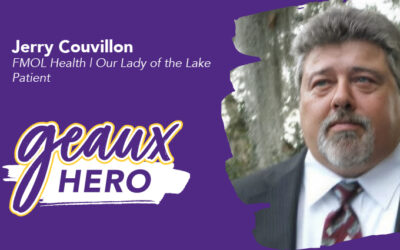Sharing your story, even when it’s painful or difficult, is an important step toward healing. Behavioral and mental health providers listen in ways to encourage that type of healing.
Bonnie Moore, senior director of patient care for St. Dominic Hospital Behavioral Health Services, explains why listening matters within the context of her team’s work.
Oftentimes a person who is sharing hasn’t fully comprehended what’s going on, Moore says.
In behavioral health management or therapy, the person may be sharing things they’ve never shared with anyone else, and providers are trained to listen, provide those cues of listening, and suppress any urge to react with shock.
Listening Diffused a Tense Situation
Moore says she and her team all have stories of how listening to their patients made a big difference. For example, Moore was able to ease tension when a patient’s daughter was terribly upset, saying things Moore knew weren’t true.
“I didn’t contradict her; I just let her talk,” Moore remembers. “In the end, she was tearful and saying, ‘I just don’t know what I’m going to do without my mom.’” Truly listening helped the patient’s daughter unburden herself and identify the real reason for her feelings.
“People just want to be heard and to be listened to. In our line of work, you have to listen,” Moore says. “Sometimes people don’t even know where their anger is coming from.”
Feeling Better After Sharing
We often feel better after we’ve shared something or really have been heard.
“Sometimes it’s a lot like a burden; you’re carrying around something heavy,” Moore says. “When you share it with someone else, the weight of that is lifted somewhat. When you share something that’s traumatic or hurtful, it lightens your load.”
Often sharing can be easier with a stranger, although mental health professionals are not actually strangers. “We’re invested in helping patients live their best lives,” Moore explains.
Preparing to Share. Prepare to Be Heard.
When you anticipate an appointment with a mental or behavioral health provider, prepare just as you would for any other doctor’s appointment.
“Write things down beforehand, that way you won’t have to worry,” Moore says. Knowing you have your concerns and topics written down can help you listen well, letting your mind rest and allow you to better engage with anything your provider shares.
Behavioral health providers, including Moore’s team at St. Dominic’s, are always mindful of their role and how sharing is directly linked to healing.
“For us this may be something we do every day, but for this person it’s a crisis,” she says. “We don’t let our familiarity with the situation and process make us dismissive of anything. We give our time and focus to listening.”
Listening Tips
Some of the tips Moore shares with her staff are practical and have value for anyone. Put down your pencil, take your hand off the doorknob, and paraphrase back to be sure you understood what was just said.
Active listening skills are a high priority, and the power of listening in healthcare is key to how healthcare is provided.
Better Emotional Health Leads to Improved Physical Health
Mental and physical health are concretely linked. “If you’re not feeling mentally healthy, you’re less likely to even seek out healthcare,” Moore says. “Staying physically healthy helps your mental health.”
The reverse can be true as well. People with untreated mental illnesses often cannot take care of themselves physically.
Moore advises to find a good groove. “Eat as well as you can and exercise, keep up with socialization and do something new that you’ve never done before,” she says. Trying new things regularly can keep you happier and enjoying life.




